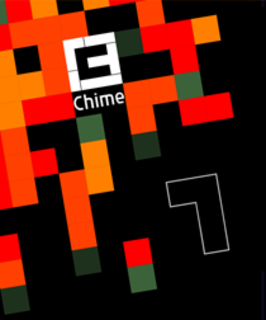$5 for an addictive puzzler and a good cause.
For a new game, the stingy price tag of $5 often gives warning that you are about to waste precious moments of your time on a piece of shovelware, wishing you had instead put your cash towards a Cheesy Gordita Crunch regardless of the digestive consequences. Fortunately, Chime earns every cent of your paper Lincoln, quelling any potential pang of regret you may have otherwise had while driving by your local Taco Bell. That is assuming that you can put down the controller long enough to get out of your house, of course. Heck, Chime might even improve your self-image just a tad, since it is the first game released by OneBigGame, a non-profit video game publisher, the first of its kind. OneBigGame released Chime to benefit the Save the Children and Starlight Children's Foundation charities. So, Zoë Mode developed an actually good game at very low cost to the consumer and is not even asking for any money in return for it? Yes, that is exactly the case.
The basic puzzle mechanic that drives Chime is a variation on the tried and true fit-blocks-together method. Instead of columns and falling shapes, the player starts with a large grid which serves as an empty, flat canvas. Differently-shaped blocks are provided one at a time, which will draw immediate comparison to those found in the classic puzzle video game, Tetris. Each one can be freely moved about the grid and rotated before placed, at which time the player is presented with another block. The goal is to fit the blocks together to create "quads," which are 4-sided shapes that are no smaller than 3 grid squares by 3 grid squares. Points are doled out to the player, with more points earned for larger quads.
What makes Chime so endearing is how it incorporates music into its puzzle mechanic. Each level is accompanied by a particular song to go with its unique grid shape. While the player is placing blocks on the grid, a sweeping "beatline" moves across from left to right in time with the music. As quads are formed, they can be built upon and grown by adding shapes to them until the beatline reaches them, at which time they are stamped to the canvas and that area is considered "covered," with the ultimate goal being to reach 100% coverage on each level. All the while, every block placed on the canvas also serves as a musical note, played as the beatline passes over it. The note differs depending on the location and shape of the block. Consequently, the player doubles as a veritable composer while the blocks on the grid add new melodic layers to the song.
All of this is taking place in a race against time. As stated before, once a quad is established by creating a solid 3 by 3 shape on the grid, it can be made larger by adding additional blocks to it, but only until the beatline reaches it. Larger quads result in larger scores, creating a sense of urgency when adding to a quad before the beatline permanently stamps it to the grid. Alternatively, score multipliers can be achieved by having multiple active quads on the grid simultaneously. Things can get quite intense with a few quads on the grid, rushing to build on each of them before the beatline gets there.
Chime can be played in one of two ways, in Timed mode or Free mode. Timed mode is the primary game mode which gives the player a set amount of minutes (configurable as nine, six, or three minute limits) to cover as much of the grid as possible with stamped quads. Once time has expired, the score is tallied and the player moves on to the next level. Free Mode has no time limit, and serves as a more relaxing experience, as the player is free to casually cover the grid, and allows for more time to be melodically creative with block placement adding to the song accompanying the level.
The songs themselves are a highlight of Chime. Philip Glass, Moby, Paul Hartnoll, Markus Schulz, and Fred Deakin have each donated one song to the game, providing a top-notch soundtrack to an already addictive puzzler. To top it off, the PC version of the game released on the Steam distribution platform also includes the song "Still Alive," the infectiously catchy tune heard during the ending credits of Portal, the hit game from developer Valve. For this reason alone, the PC version of the game comes away slightly more favorable than the Xbox 360 release. The two versions are otherwise identical.
The only real shortcoming of the game is its limited number of levels. Since Chime was released as a benefit to charity, no compensation was able to be offered to the music artists, which would naturally result in limited output. Thankfully, the songs featured in the game were submitted by their professional computers pro bono. While beggars can't be choosers, limited songs mean limited levels, and limited levels means limited replayability. One can hope that Zoë Mode would eventually release additional levels and songs as downloadable content, but it remains to be seen how much post-release support a non-profit game could garner from its developer.
Chime takes the classic shape-fitting puzzle mechanic and freshens it with the incorporation of music. The result is an addictive puzzler that it as enjoyable to listen to as it is to play. The songs themselves will keep you coming back for more as you compare your scores to the in-game leaderboard, driving you to improve. The few levels will eventually wear out their welcome, but not before easily soaking up hours of your time. In the end, this game effortlessly transcends its $5 price tag.

